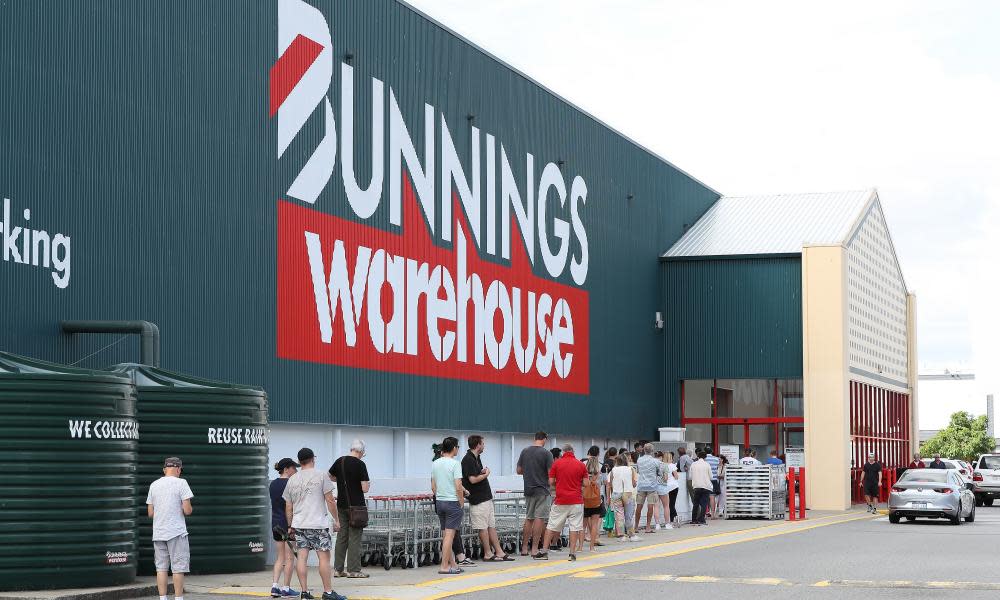Health workers 'going to Bunnings' to source personal protective equipment, doctor tells Q+A

Senior health workers have resorted to shopping at Bunnings to source personal protective equipment because of shortages during the Covid-19 crisis, an emergency doctor has said.
Stephen Parnis, a Victorian emergency doctor and former vice president of the Australian Medical Association, told the ABC’s Q+A program on Monday night that health workers were “very worried” about supplies of protective equipment.
“I spoke to a number of colleagues around the country before coming on to the program and I have to say we’re all very worried about the provision of personal protective equipment,” Parnis said.
Related: Delay in locally sourcing coronavirus tests is a ‘failure of government’, crossbencher says
“I’ve seen department directors going to Bunnings and seen people look and hope they might have contacts overseas. And it’s probably the number one concern for health workers around the country at the moment.
Guardian Australia has previously reported fears of shortages of PPE in the health system as the number of cases of Covid-19 rises across Australia. Rural Aboriginal medical services in particular face a “catastrophic” shortage.
Monday’s Q+A, dedicated to the experiences of frontline healthcare workers, revealed significant concern among doctors about the shortage.
Vyom Sharma, a general practitioner from Victoria, said his practice was down to about 10 surgical masks and suggested the federal government should have done more to source supplies sooner.
“We’re trying to save them for when we really need them,” he said.
“And the concern is it’s actually affecting the nature of care we can provide. We are transitioning to telehealth at the moment, offering face-to-face consultations when required. But they have to be reduced in a way that’s commensurate to the supply we have available.
“It’s correct what Steven [Parnis] said, we’re very worried about the lack of personal protective equipment and it’s been affecting the care we’ve been offering patients throughout. When the criteria for Covid-19 had been changing gradually through February and March, a huge percentage of my population were overseas students and travellers and tourists.
“And you’re rationing masks even then. And there are people coughing and sneezing one day who come from South Korea or Italy and a few day later the criteria changes and it says these people are high risk and you wonder ‘should I have used a mask on them and I would have if I had enough’.”
Lucy Morgan, a respiratory physician from Sydney’s Nepean hospital, said she was “reassured” by work done to supply public hospitals with PPE as the number of Covid-19 cases began to quickly escalate in March. But, she said, healthcare workers in other areas including GPs and specialists in private practice could find it harder to source equipment.
“Their access to protective gear is a little bit less secure. I think they have, they haven’t got the same bargaining power or purchasing power that hospitals or health departments have. And I think that’s another challenge for us,” she said.
Also on Monday, shadow minister for health Chris Bowen criticised the Ruby Princess fiasco after the death of a 12th former passenger of the cruise ship.
“There has to be a full explanation to the Australian people about how Border Force let that happen. It is just unacceptable.”
Liberal MP Katie Allen said she was pleased that New South Wales police commissioner Mick Fuller had launched a criminal investigation into the Ruby Princess case “so that we can get to the bottom of actually what happened”.
A former medical researcher, Allen said the government had been increasing hospital capacity in preparation for more cases of the virus.
“As a government, we’re being very careful about looking at ventilator capacity and we’re also bringing more nurses online because those intensive care beds need 24-hour care and we do need more nurses,” she said.
“[We are] bringing more people into the workforce to make sure we’re ready for a possibility that may actually not actually eventuate but we need to prepare for the worst and hope for the best.”

 Yahoo News
Yahoo News 
